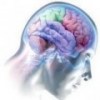Khalil Gibran said that "music is the language of the spirit," but today many would claim it can convey only a general impression or mood. However, recent research has shown that the meaning of musical passages can be surprisingly specific. In their 2004 article, Koelsch et al. demonstrate that even 10-second musical excerpts can build up concrete semantic expectations, the same as short sentences. (I just learned that Cognitive Daily covered this same study yesterday, so I'll try to put a slightly different spin on it in this post.)
Normally, when people hear a sentence followed by an unexpected word (e.g., "The shackles allow only a little movement. ... Wideness.") their scalp electrical activity sharply dips around 400 miliseconds after the unexpected word. In contrast, no negative dip in electrical activity is seen if the word is more contextually appropriate - such as "restrained." Likewise, this wave does not appear for words that are only grammatically incorrect. Therefore, this wave (called the N400) seems to be a signature of semantic processing by the brain.
The authors wondered whether the same negative wave would occur if the word "wideness" followed a excerpt from Strauss's Salome - a dissonant musical piece with a narrow tonal range - instead of following a short sentence. In contrast, no N400 should exist if "wideness" follows Valpola's E-Minor Piece for the Accordion, which utilizes a wide tonal range.
The results confirmed this idea - the same N400 wave occurs in response to words following incompatible musical clips as to words following incompatible sentences. Conversely, words following compatible musical excerpts elicited no N400.
Somehow, the musical passages were actually communicating the same expectations and eliciting the same neural activity as language! In fact, the N400 wave was just as strong in response to unexpected abstract words as to unexpected concrete words, suggesting music has impressive communicative flexibility.
Even more suprising is that the same effect was found when classifying musical excerpts based on the composers' self-report. For example, no N400 wave appeared if Schoenberg's String Terzett was played before presentation of the related word "needle" - Schoenberg had crafted this piece to describe the stitching pains of a heart attack. In contrast, N400 waves were found if "river" followed the same passge, nor if words like "needle" followed musical clips where the composers had ideas related to "river" in mind.
Importantly none of the 44 people who participated in the experiment were musical experts.Try listening to the excertps to see if you agree with the "related" and "unrelated" words!
Edit: I just learned that Cognitive Daily wrote about this same study yesterday! Check out Dave's analysis here. What a coincidence!
Related Posts:
Neural Oscillations and the Mozart Effect

really F'n cool! :)
This has got to be the weirdest coincidence. Cognitive Daily posted on the exact same study yesterday!
Ooops!
You might find this interesting:
http://www.sciencemag.org/cgi/content/full/315/5813/758
Zatorre works out of MNI, where I also do my research!